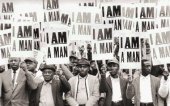Oh! yay! yah! darkies laugh wid me,
For de white folks say Ole Shady's free,
So don't you see dat de jubilee
Is a coming, coming,
Hail mighty day.
Den away, away, for I can't wait any longer,
Hooray, hooray, I'm going home.
Den away, away, for I can't wait any longer,
Hooray, hooray, I'm going home.
Oh, Mass' got scared and so did his lady,
Dis chile breaks for Ole Uncle Aby,
"Open de gates out here's Ole Shady's
coming, coming."
Hail mighty day.
Den away, away, for I can't wait any longer,
Hooray, hooray, I'm going home.
Den away, away, for I can't wait any longer,
Hooray, hooray, I'm going home.
Good bye Mass' Jeff, good by Mis'r Stephens,
'Scuse dis niggah for takin his leavins,
'Spect pretty soon you'll hear Uncle Abram's
coming, comming,
Hail mighty day.
Den away, away, for I can't wait any longer,
Hooray, hooray, I'm going home.
Den away, away, for I can't wait any longer,
Hooray, hooray, I'm going home.
Good by hard work wid never any pay,
Ise a gwine up North where the good folks say,
Dat white wheat bread and a dollar a day
Are coming, comming,
Hail mighty day.
Oh, I've got a wife, and I've never got a baby,
Living up yonder in Lower Canady",
Wont dey laugh when dey see Ole Shady
A coming, coming,
Hail mighty day.
For de white folks say Ole Shady's free,
So don't you see dat de jubilee
Is a coming, coming,
Hail mighty day.
Den away, away, for I can't wait any longer,
Hooray, hooray, I'm going home.
Den away, away, for I can't wait any longer,
Hooray, hooray, I'm going home.
Oh, Mass' got scared and so did his lady,
Dis chile breaks for Ole Uncle Aby,
"Open de gates out here's Ole Shady's
coming, coming."
Hail mighty day.
Den away, away, for I can't wait any longer,
Hooray, hooray, I'm going home.
Den away, away, for I can't wait any longer,
Hooray, hooray, I'm going home.
Good bye Mass' Jeff, good by Mis'r Stephens,
'Scuse dis niggah for takin his leavins,
'Spect pretty soon you'll hear Uncle Abram's
coming, comming,
Hail mighty day.
Den away, away, for I can't wait any longer,
Hooray, hooray, I'm going home.
Den away, away, for I can't wait any longer,
Hooray, hooray, I'm going home.
Good by hard work wid never any pay,
Ise a gwine up North where the good folks say,
Dat white wheat bread and a dollar a day
Are coming, comming,
Hail mighty day.
Oh, I've got a wife, and I've never got a baby,
Living up yonder in Lower Canady",
Wont dey laugh when dey see Ole Shady
A coming, coming,
Hail mighty day.
envoyé par Bernart Bartleby - 28/8/2015 - 14:58
×
![]()








Parole e musica di Benjamin Russell Hanby (1833-1867), compositore e pastore evangelico.
Convinto abolizionista, con suo padre William fu attivo nell’organizzazione dell’“Underground Railroad”, la rete clandestina che assisteva gli schiavi neri che fuggivano verso il nord.
Testo trovato su Public Domain Music, nella sezione “American Civil War Music (1861-1865)”
Credo che “Ole Shady” stia per “Old Darkie, o Nigger”, cioè “vecchio negro”…
Tenuto conto che il brano è stato composto nel 1861, all’inizio quindi della Guerra Civile, credo che il racconto parli di uno schiavo che intende fuggire al nord, verso il Canada, con la compagna perché gli è giunta voce che i bianchi del nord sono contro lo schiavismo e questa è una delle ragioni della guerra appena iniziata.
Gli altri schiavi ridono della sua intenzione ma lui è determinato: prenderà l’“Underground Railroad” e quando sarà libero nessuno riderà più di lui…
Per il significato di “contraband” si legga invece quanto segue:
Molti contrabands chiesero ed ottennero (o fu loro imposto, o non avevano molte alternative…) di combattere nelle fila dell’Unione, ma i vertici militari non consentirono la creazione di unità miste: i contrabands furono destinati ai reggimenti delle United States Colored Troops, dove già erano integrati americani di origine asiatica, o delle isole del Pacifico, o indigeni nativi. Unità militari come i cosiddetti Buffalo Soldiers – i pellenera che dopo la Guerra Civile vennero mandati ad ammazzare i pellerossa - erano interamente costituite da schiavi fuggiaschi ma “di contrabbando”, non liberi e finalmente… segregati!
Il più grande campo di concentramento di negri fuggiaschi era il Grand Contraband Camp nei pressi di Hampton, in Virginia, chiamato dai suoi ospiti “Slabtown” (sinonimo di slum, letteralmente agglomerato di baracche di lamiera). Ma verso la fine della guerra i campi dei contrabands negli Stati ribelli sconfitti dall’Unione erano un centinaio, compresa la famosa “Freedman's Colony” di Roanoke Island, North Carolina, fondata dall’esercito dopo aver conquistato e requisito un forte sudista, dove oltre 3.500 contrabands vissero in modo quasi del tutto autosufficiente per qualche anno. Alcune centinaia di loro non se ne andarono mai e lì vivono ancora i loro discendenti.